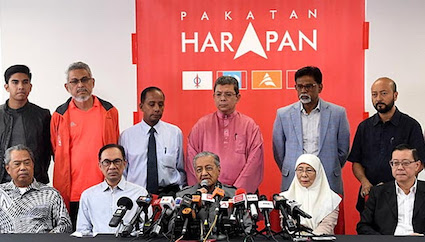The “khemah besar” nonsense

The “khemah besar” electoral pact will be so unstable that it may never even get to form the government if it wins GE15. And against the backdrop of so much uncertainty, the voters, especially the Chinese who need political stability for the economy to thrive, will fear voting for the opposition electoral pact.
NO HOLDS BARRED
Raja Petra Kamarudin
As what Warisan’s Shafie Apdal said today, the “khemah besar” or “big tent” idea is a non-starter if there is no common ground or strong foundation for such a bloc or coalition.
To start off with, the “khemah besar” proposal is not an opposition bloc or coalition. It is merely an electoral pact to face GE15. And the purpose of this pact is to ensure a satu-lawan-satu or straight fight in the general election and avoid three-, four-, five-corner fights, or more.
Hence it is an understanding just to contest the election and not an understanding on what to do after the election, especially if this “khemah besar” bloc manages to defeat Umno-Barisan Nasional and win the election.
In short, the “khemah besar” pact is a pre-GE15 understanding, not a post-GE15 understanding.
For example, Pakatan Harapan refuses to name their candidate for prime minister if they happen to win GE15. They also refuse to name their shadow cabinet, which normally would be the post-GE15 cabinet if Pakatan Harapan or the “khemah besar” electoral pact were to win GE15.
The one and only objective of the “khemah besar” electoral pact is to beat Umno-Barisan Nasional in GE15. Post-GE15, in the event the “khemah besar” electoral pact does manage to beat Umno-Barisan Nasional, the members of the electoral pact will then sit down and discuss again what happens.
And what happens will all depend on which party wins whatever number of seats. As in the present situation, Umno, which has the highest number of seats in parliament, bullies everyone else and acts as the “big brother” or warlord. The same will happen with the “khemah besar” electoral pact after GE15.
The “khemah besar” electoral pact will be so unstable that it may never even get to form the government if it wins GE15. And against the backdrop of so much uncertainty, the voters, especially the Chinese who need political stability for the economy to thrive, will fear voting for the opposition electoral pact.
The “khemah besar” electoral pact will need to first agree on a common election manifesto and present this to the voters. How will this common election manifesto look like?
These are some of the areas of great concern to Malaysians that will need to be addressed:
1. Independence of the judiciary.
2. Separation of powers between the Chief Executive, Parliament, Judiciary and Monarchy policy.
3. Appointment of the CJ, MACC KP, AG, IGP, etc., policy.
4. Education policy.
5. Policy on Islam.
6. Policy on Sharia laws.
7. The Bumiputera affirmative action policy.
8. The National Language policy.
9. The racial discrimination policy.
10. The religious discrimination policy.
11. The oil-and-gas royalty policy.
12. Sabah’s and Sarawak’s status and autonomy policy
13. The electoral boundaries delineation policy.
14. The immigration and foreign workers policy.
15. The minimum wage policy.
16. The free healthcare policy.
These are just some of many issues that Malaysians would like to see resolved. How would the “khemah besar” electoral pact address all these issues of concern in their GE15 election manifesto? Or will there be no common ground for all these issues? In that case what do they have to offer the Malaysian voters?

